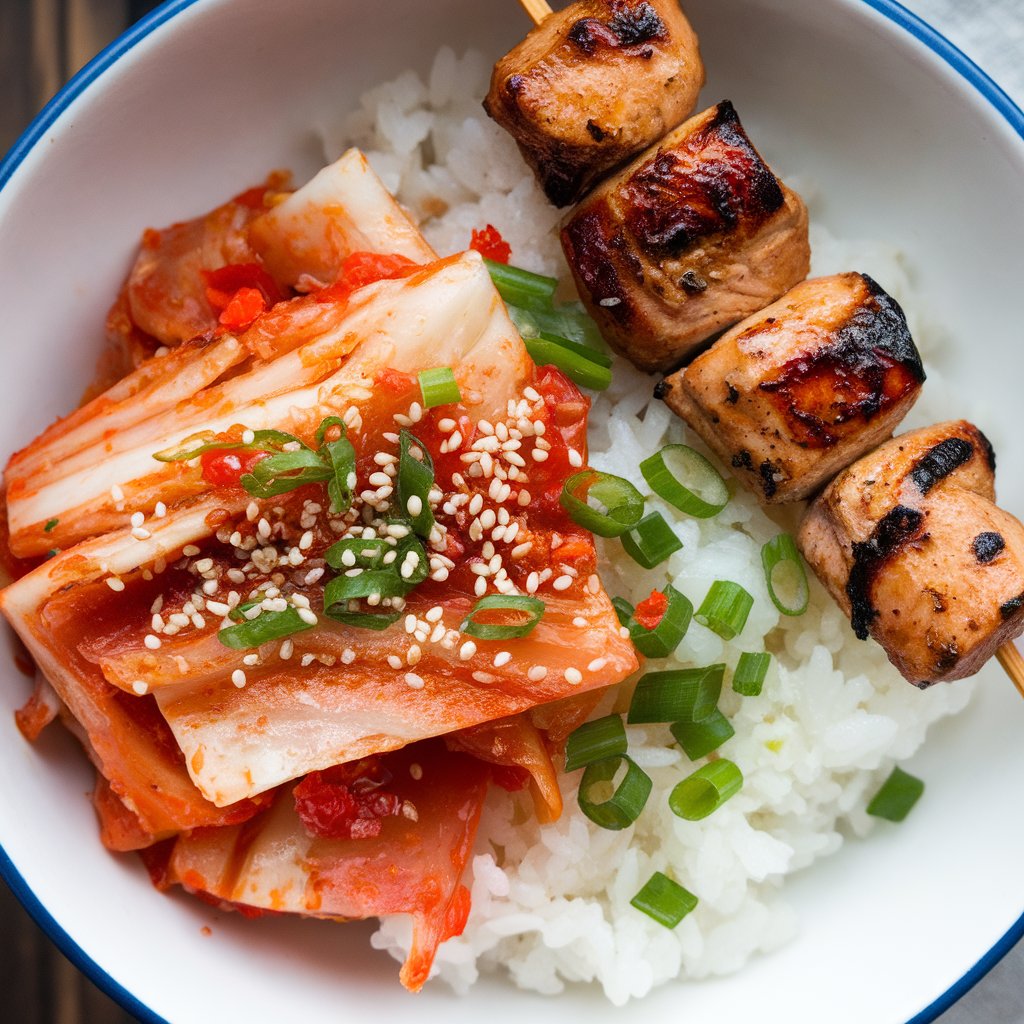Introduction
The Benefits of Fermented Foods in Halal Lunches

Fermented foods are rich in probiotics, which are beneficial bacteria that support a balanced gut microbiome. Many traditional fermented foods, however, include non-halal ingredients like alcohol or certain types of animal-based additives. The recipes in this article adapt fermented-inspired flavors without any non-halal ingredients, making them safe and suitable for those following a halal diet.
1. Boosting Gut Health and Digestion
Probiotics in fermented foods help to populate the gut with beneficial bacteria, aiding in digestion and improving nutrient absorption. Including fermented-inspired elements like kimchi, yogurt, and pickled vegetables in your meals can support a healthy digestive system, reduce bloating, and boost immunity.
2. Enhancing Flavor and Texture
Fermentation introduces unique flavors—often tangy, spicy, or umami-rich—that can transform a dish from simple to complex. Even though many traditional fermented foods are not halal, there are plenty of ways to achieve similar flavors using halal-certified ingredients, adding depth and texture to your meals.
3. Versatile and Nutrient-Dense Options
Fermented-inspired ingredients are also nutrient-dense, often containing vitamins, minerals, and antioxidants. When incorporated into balanced meals, they provide sustained energy and nourishment, making them perfect for lunch.
Key Ingredients for Halal-Friendly Fermented-Inspired Lunch Recipes
Each of these ingredients plays a role in achieving the tangy, savory notes associated with fermented foods while ensuring full halal compliance.
1. Halal Kimchi
Kimchi, a Korean staple, is made from fermented cabbage and other vegetables and is known for its spicy, tangy taste. While traditional kimchi can include non-halal ingredients like fish sauce, halal versions are available that use only halal-friendly seasonings. Halal kimchi pairs well with wraps, bowls, or as a flavor-packed side.
2. Pickled Vegetables
Pickled vegetables like cucumbers, carrots, and radishes add a refreshing crunch to dishes. Quick pickling is easy to do at home with halal-friendly ingredients and brings a tangy twist to wraps, sandwiches, and salads. Pickled veggies are also high in fiber and can help balance heavier meal components.
3. Miso (Halal-Certified)
Miso, a Japanese fermented soybean paste, is full of umami and adds a unique savory flavor. Look for halal-certified miso paste to ensure it contains no alcohol-based fermentation or additives. It’s excellent in soups, salad dressings, and marinades.
4. Yogurt and Labneh
Yogurt and labneh (a thickened, strained yogurt) are dairy-based fermented foods that provide creaminess and probiotics. Use them in sauces, dips, or spreads. They also offer a protein and calcium boost, making them a great addition to salads and wraps.
5. Fermented Hot Sauce
Fermented hot sauces add spice and a slight tang to meals. When choosing halal-certified fermented hot sauces, ensure they contain no alcohol-based preservatives or non-halal flavorings. Use them in bowls, on sandwiches, or as a topping to give your lunch a bit of a kick.
15 Quick and Easy Fermented-Inspired Halal Lunch Recipes

Each recipe in this section is designed to be simple to prepare, full of flavor, and ideal for lunch. Altogether, these recipes combine the best of fermented-inspired flavors with wholesome, halal ingredients to create balanced meals that are satisfying, nutrient-packed, and convenient.
1. Kimchi and Avocado Wrap
- Ingredients: Whole-grain wrap, halal kimchi, avocado slices, shredded carrots, lettuce, sesame seeds.
- Instructions:
- To start, lay out the wrap and layer it with lettuce, kimchi, avocado slices, and shredded carrots.
- Next, sprinkle sesame seeds on top, then roll up tightly and enjoy.
- Tip: For added protein, try including tofu slices or chickpeas.
2. Miso-Glazed Tofu Bowl with Pickled Vegetables
- Ingredients: Cooked rice, tofu, miso paste (halal-certified), sesame oil, pickled cucumbers, sliced radishes.
- Instructions:
- Begin by marinating tofu in a mixture of miso paste and sesame oil, then pan-fry until golden.
- After that, serve the tofu over rice and top with pickled cucumbers and radishes for a tangy finish.
- Tip: For extra flavor, consider adding a drizzle of sesame sauce.
3. Yogurt and Herb Salad with Chickpeas
- Ingredients: Plain yogurt, chopped parsley, chopped dill, chickpeas, diced cucumbers, lemon juice.
- Instructions:
- First, in a bowl, mix yogurt with herbs, lemon juice, and salt to taste.
- Then, add chickpeas and cucumbers, tossing gently to coat everything evenly.
- Tip: Substitute labneh for a thicker consistency and richer flavor.
4. Fermented Hot Sauce Burrito Bowl
- Ingredients: Brown rice, black beans, corn, avocado, halal-certified fermented hot sauce.
- Instructions:
- Start by layering brown rice, black beans, corn, and avocado in a bowl.
- Drizzle with fermented hot sauce for a spicy, tangy kick.
- Tip: For an extra burst of flavor, top with fresh cilantro.
5. Kimchi Fried Rice with Vegetables
- Ingredients: Cooked rice, halal kimchi, mixed vegetables (like carrots and bell peppers), halal-certified soy sauce.
- Instructions:
- To begin, sauté kimchi and mixed vegetables in a pan, then add rice and soy sauce.
- Continue cooking until everything is heated through and well mixed.
- Tip: Garnish with green onions and sesame seeds for added texture.
6. Cucumber and Carrot Pickle Sandwich with Labneh
- Ingredients: Whole-grain bread, labneh (strained yogurt), cucumber pickles, shredded carrots, fresh mint leaves.
- Instructions:
- Spread a layer of labneh on each slice of bread.
- Then, add cucumber pickles, shredded carrots, and fresh mint leaves before closing the sandwich.
- Tip: Toast the bread for added texture and warmth.
7. Miso Soup with Tofu and Seaweed
- Ingredients: Halal-certified miso paste, tofu cubes, seaweed (nori or wakame), green onions, water or vegetable broth.
- Instructions:
- Bring water or vegetable broth to a boil, then lower the heat.
- Stir in miso paste until dissolved, followed by tofu cubes and seaweed.
- Tip: Add a sprinkle of sesame seeds for extra flavor and texture.
8. Chickpea and Kimchi Salad Wrap
- Ingredients: Whole-wheat wrap, halal kimchi, chickpeas, shredded lettuce, diced tomatoes, tahini sauce.
- Instructions:
- In a bowl, combine chickpeas, kimchi, lettuce, and tomatoes.
- Afterward, drizzle tahini sauce over the mixture, then place it onto a whole-wheat wrap and roll tightly.
- Tip: For added crunch, include thinly sliced bell peppers.
9. Greek Yogurt and Herb Wrap with Cucumbers
- Ingredients: Whole-wheat wrap, Greek yogurt, fresh dill, cucumber slices, lettuce, cherry tomatoes, lemon zest.
- Instructions:
- Spread Greek yogurt on the wrap, then layer with cucumber, lettuce, and tomatoes.
- Next, sprinkle with fresh dill and a pinch of lemon zest for added freshness.
- Tip: For a creamier option, use labneh instead of Greek yogurt.
10. Fermented Hot Sauce Glazed Veggie Wrap
- Ingredients: Mixed vegetables (like bell peppers, zucchini, and carrots), halal-certified fermented hot sauce, whole-wheat wrap, hummus.
- Instructions:
- Sauté mixed vegetables and coat them with a bit of fermented hot sauce.
- Spread hummus on a whole-wheat wrap, then add the veggies and roll tightly.
- Tip: For extra creaminess, add sliced avocado.
11. Tahini and Miso Salad with Quinoa
- Ingredients: Cooked quinoa, halal-certified miso paste, tahini, shredded carrots, chopped kale, cucumber.
- Instructions:
- In a small bowl, mix miso paste with tahini to create a dressing.
- Toss quinoa, carrots, kale, and cucumber with the dressing until well coated.
- Tip: Sprinkle with sesame seeds for added calcium and crunch.
12. Kimchi and Mushroom Rice Bowl
- Ingredients: Cooked rice, halal kimchi, sautéed mushrooms, green onions, sesame seeds, soy sauce.
- Instructions:
- Sauté mushrooms until tender, then add to a bowl with rice, kimchi, and green onions.
- Drizzle with soy sauce and sprinkle sesame seeds on top.
- Tip: For extra crunch, add sliced radishes.
13. Pickled Veggie and Hummus Pita
- Ingredients: Whole-wheat pita, hummus, quick-pickled cucumbers and carrots, shredded lettuce, fresh parsley.
- Instructions:
- Spread hummus inside the pita pocket.
- Stuff with quick-pickled cucumbers, carrots, shredded lettuce, and parsley.
- Tip: Add a dash of sumac for a tangy flavor boost.
14. Labneh and Za’atar Veggie Wrap
- Ingredients: Whole-wheat wrap, labneh, sliced cucumbers, diced tomatoes, shredded lettuce, za’atar seasoning.
- Instructions:
- Spread labneh on the wrap, layer with cucumbers, tomatoes, and lettuce.
- Next, sprinkle za’atar seasoning on top and roll up tightly.
- Tip: Add olives for a salty contrast to the creamy labneh.
15. Fermented Salsa Bowl with Black Beans
- Ingredients: Brown rice, black beans, corn, fermented salsa (halal-certified), diced avocado, lime juice.
- Instructions:
- In a bowl, layer brown rice, black beans, corn, and avocado.
- Finally, top with fermented salsa and a squeeze of lime juice.
- Tip: Garnish with fresh cilantro and a sprinkle of cheese (if non-dairy).
Nutritional Benefits of Fermented-Inspired Halal Lunches

1. Probiotic Benefits for Gut Health
To start, fermented-inspired halal dishes can provide a natural source of probiotics. These beneficial bacteria play an essential role in balancing the gut microbiome, which in turn promotes a healthy digestive system. Additionally, a balanced microbiome can lead to improved nutrient absorption and stronger immune function, both of which are key to overall wellness.
2. High Nutrient Density
Furthermore, these recipes feature nutrient-dense ingredients like vegetables, legumes, grains, and fermented-inspired condiments. Not only are they packed with fiber, vitamins, and minerals, but they also provide the balanced nutrition that’s essential for energy and daily health. Altogether, these meals offer a comprehensive nutritional profile that fuels both body and mind.
3. Antioxidant and Anti-Inflammatory Properties
Moreover, fermented foods contain antioxidants, which are known for their ability to combat inflammation and protect cells from damage. The spices, vegetables, and herbs added to these recipes boost antioxidant intake even further, thereby supporting long-term health and resilience against stress.
Frequently Asked Questions (FAQ)
- Can I make halal kimchi at home?
- Yes, you can make halal kimchi by omitting non-halal ingredients like fish sauce and using halal-certified spices. Homemade kimchi offers full control over the ingredients.
- What are some quick ways to add fermented flavors to my lunch?
- Incorporate halal kimchi, quick-pickled veggies, and halal-certified fermented hot sauces. These options are convenient, tangy, and add a unique taste to simple meals.
- How can I ensure my fermented foods are halal?
- Look for halal certification on store-bought products, especially for items like miso and hot sauces. When in doubt, making your own fermented foods at home provides the best assurance.
- Are fermented foods safe for everyone?
- Most fermented foods are safe, but those with digestive sensitivities should introduce them gradually. The natural probiotics can take some getting used to, so start with small portions if you’re new to them.
Related Articles
For more halal-friendly and inspired lunch recipes, explore these popular ideas from Tiffani Recipes:
- 5-Ingredient Halal Keto Lunch Wraps
Try these easy, keto-friendly wraps perfect for a quick, satisfying lunch. - Middle Eastern-Spanish Fusion Bowls: A Unique Halal Twist
Discover fusion flavors that combine Middle Eastern and Spanish ingredients in a halal-friendly bowl. - Protein-Packed Pumpkin Seed Salad
This protein-rich, plant-based salad is ideal for meal prep and busy lunches. - Refreshing Cold Noodle Lunches
Enjoy these refreshing, plant-based cold noodle dishes for a satisfying and cool midday meal.
Conclusion: Embrace the Flavor and Health of Fermented-Inspired Halal Lunches
Fermented-inspired halal lunches bring exciting flavors and health benefits to your daily routine. By incorporating ingredients like halal kimchi, pickled vegetables, and yogurt-based dressings, you can boost gut health, improve digestion, and enjoy a diverse range of flavors. These recipes make it easy to create balanced, nutrient-dense lunches that are quick, satisfying, and halal-compliant.
For more insights on the health benefits of fermented foods, check out HealthLine .
